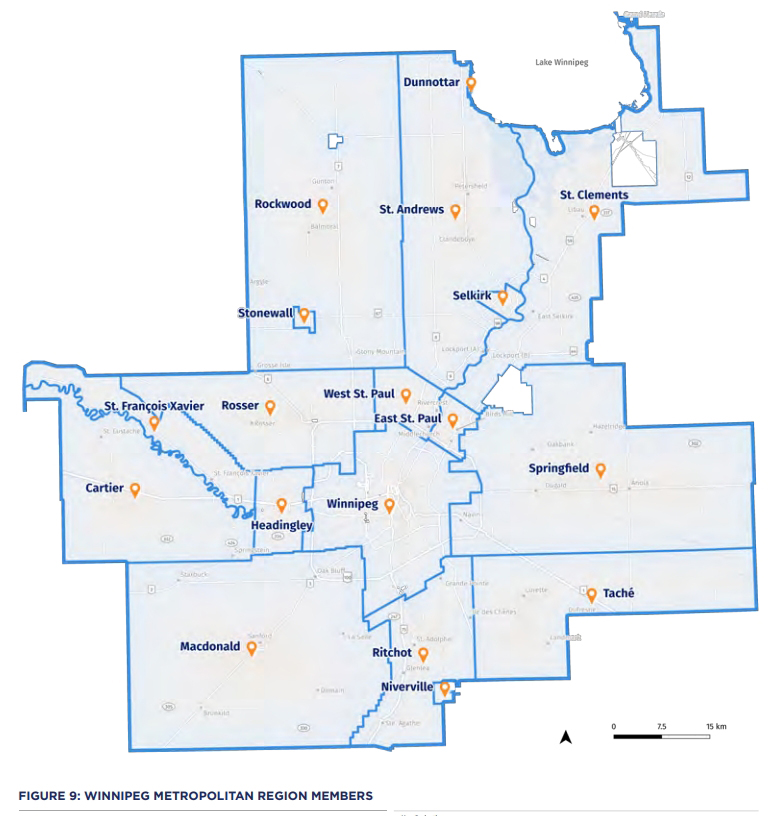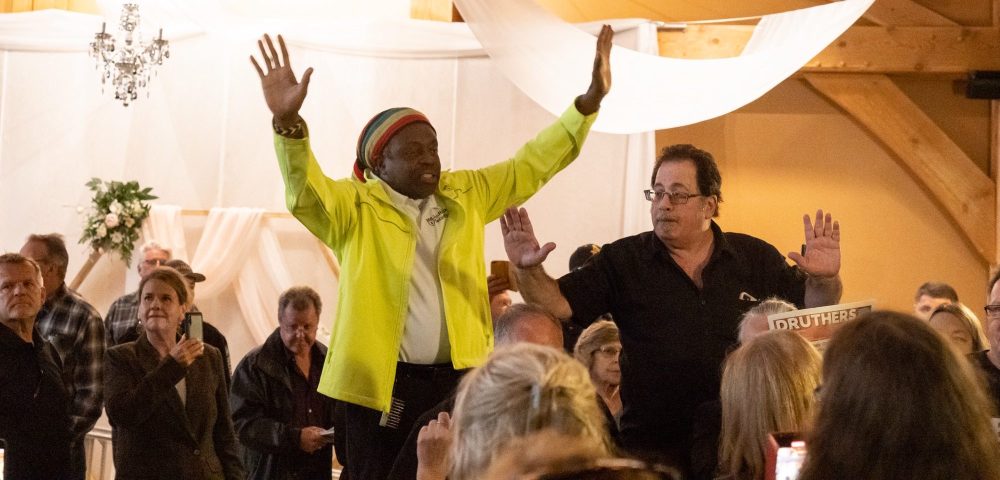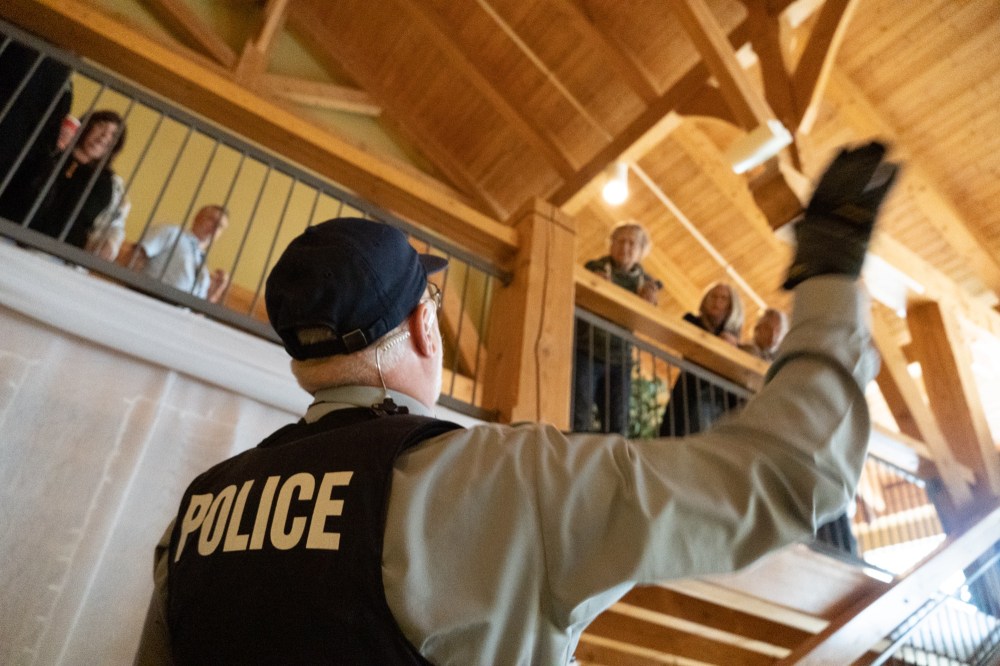Public hearing on regional plan cancelled due to large crowd
Advertisement
Hey there, time traveller!
This article was published 18/08/2024 (319 days ago), so information in it may no longer be current.
A regional plan public hearing in Niverville on Aug. 8, that was set to layout the framework for the next 30 years of development in Winnipeg and surrounding municipalities, was cancelled due to a larger than expected turnout of people. It also led to council denouncing the plan.
Plan 20-50 lays out a regional plan for Manitoba’s Capital Region, which consists of 18 municipalities including the Town of Niverville and the RMs of Springfield, Tache, and Ritchot who together form the provincially created Winnipeg Metropolitan Region (WMR).
The plan lays down the long-term framework to coordinate land use, servicing, and infrastructure. Plan 20-50 considers: community growth and development, infrastructure investment and servicing, regional economic development, watershed and natural asset stewardship, climate resilience, agriculture and resources, and collaboration with Indigenous Nations, according to the WMR website.

While a large crowd formed inside the ballroom (which holds 250 people), an even larger crowd was pressing to get into the room from the outside with chants of “Let us in! Let us in!” while chants of “Let them in! Let them in!” was heard from inside. The crowd also got volatile shouting expletives at reeves and mayors as they tried to make their way through the crush of people.
RM of Springfield Mayor Patrick Therrien was there for the public hearing in Niverville and while he said he couldn’t answer some questions in order to remain neutral, he did acknowledge that there was a lot of fear in the crowd.
“There’s just a very huge amount of misinformation out there. A lot of fear and speculation. I respect the people there regards to their concerns, it just has to be done in a respectful manner to get the answers.
“Unfortunately, we weren’t able to get that (Thursday). It just never worked out there. The facility wasn’t the right size and (there) wasn’t a moment that we could do anything there. It became a safety issue.”
Town of Niverville Mayor Myron Dyck and RM of Ritchot Mayor Chris Ewen directed The Carillon’s request for an interview to the province and the WMR, while Mayor Armand Poirier from the RM of Tache did not return calls for comment. On Wednesday, Niverville posted on their website that council was against Plan 20-50 due to financial reasons, loss of autonomy, forced membership, and the need for the recognition of a transition zone.

The planning of a multi-municipal capital region was first explored in 1911, but more recently in 2001 when the province appointed a regional planning advisory committee. In 2020, Plan 20-50 was drafted and in January 2023 the WMR accepted the roles and responsibilities of the capital planning region under the Capital Region Partnership Act, which was passed by the province in 2006.
According to the report, over the past 30 years, the region has grown from approximately 618,000 people to over 874,000 people and is projected to grow to over 1 million people by 2050.
One of the goals of the plan is to create complete communities, which are “places that both offer and support a variety of lifestyle choices, providing opportunities for people of all ages and abilities to live, work, shop, learn, and play in close proximity to one another.” There was a large percentage of people in the crowd who were referencing complete communities as 15-minute cities with some signing a petition outside the venue against the measure.
A 15-minute city has an emphasis on public transit, goods and services, and multi-family dwellings within 15 minutes of each other and has regulations in place to enforce and promote that measure.
WMP executive director Jennifer Freeman explained that complete communities are not 15-minute cities. For example, to reduce carbon footprints, a 15-minute city establishes, promotes, and has regulations in place for using public transit systems and building infrastructure for active transportation and pedestrians. In Vienna, cars from outside the country are not allowed into the city. Instead people have to park at the city limits and take public transit into the city.

“Plan 20-50 is not about taking away people’s rights and freedoms. It’s not about forcing people to buy electronic vehicles or taking away their cars, and it’s certainly not about a 15-minute city in any way. It’s about expanding choices and opportunities in our communities and making some of these things more accessible…
“I think that’s what a complete community is. It’s about convenience and providing options. There’s nowhere in our plan that a 15-minute community is even referenced.”
The importance of having a regional plan is for economic development and to gain federal dollars. Freeman noted there are companies that are not establishing themselves in Manitoba because there is no regional plan, instead they are going to cities like Edmonton, Calgary, Halifax, and cities in Ontario, like Toronto, and in Quebec.
With 65 percent of the total population of Manitoba and approximately 66 percent of its gross domestic product, the WMR represents a significant economic centre linking Eastern and Western Canada. The region provided approximately 380,000 jobs in 2021 and is projected to increase to between 511,000 to 546,000 jobs as 2050 approaches.
Employment in the region has focused on agriculture, manufacturing, and transportation and logistics making it an important hub for Manitoba, as well as portions of Saskatchewan, Ontario, and the northern United States.

Freeman said revenue sharing within the region is something that is being explored.
She also noted there are benefits that a single municipality wouldn’t get with their own development plan.
“It’s the coordinated approach. It’s the opportunity for shared services. It’s the opportunity for more funding dollars, because they are working together so there’s more chances that those dollars will come to municipalities that are collaborating rather than just one by one.”
After the public hearing is rescheduled within 40 days, the board will make revisions to the plan and pass second reading, after which it will go to the minister’s office for review before going back to the board for third and final reading. Freeman said the plan needs to be in the minister’s office by January 2025.
Once approved, Plan 20-50 will be effective immediately. As per the planning act, municipalities and planning districts will update their development plan bylaws, secondary plan bylaws, and zoning bylaws to conform to Plan 20-50 within three years after the plan is approved. As per the act, municipalities and planning districts will not give third reading to a development plan by-law, secondary plan by-law or zoning by-law that is inconsistent with Plan 20-50.

